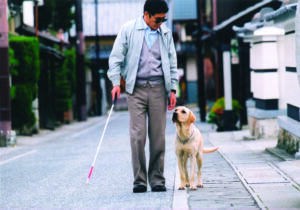- Home
- About
- Benefits & Services
- State Veterans Homes
- Nevada Veterans Memorial Cemeteries
- Community
- News
- Suicide Prevention
- Donate
- Fallen Heroes
- Nevada’s Veterans Memorials
- Calendar/Events
- Nevada Transition Assistance Program (NVTAP)

By Chuck N. Baker
(Las Vegas, Nevada) — While the Congressionally chartered Blinded Veterans Association and other veterans’ organizations, including the VA, provide support and encouragement to visually impaired veterans, the State of Nevada has additional programs to provide assistance to qualified blinded individuals including veterans.
The Department of Employment, Training and Rehabilitation (DETR) has two specialized programs that are available for individuals who are blind or have limited vision. While not exclusive to veterans, the department says veterans are greatly encouraged to apply. One of the DETR programs is labeled BEN — Business Enterprises of Nevada. Blinded individuals who qualify for the program are trained to operate their own businesses, with government backing.
Federal and State laws provide a priority right for individuals who are legally blind to operate food, beverage, and vending in federal, state and local public buildings. After qualifying with the Nevada Bureau of Services to the Blind and Visually Impaired, individuals receive training and on-the-job experience in managing and operating snack bars, cafeterias, vending machine routes and other businesses located in public buildings.
Currently, there are sites throughout Nevada operated by licensed operators who are blind. Chief Enterprise Officer Chris Mazza said, “We’re always looking for new sites — each operator can operate up to two sites.” In addition to new locations, current sites often come up again due to retirement. “So, we’re looking for new vendors all the time,” Mazza added.
The application and training processes are complex. “Becoming a client is the first step,” Mazza said. “Applicants can go on our website, or call us or stop in. That’s where the process starts. There is a level of blindness required to enter the program. Once that is approved, we look at the person’s background.” The interview focuses on what applicants have done before, if there is a strong interest in becoming a vendor, and what type of skill sets individuals have. “This is a tough program,” he said. There are on-line modules, on-the-job-training and direct education concerning hiring, product ordering, facility operation and related business and retail topics. Once that is all completed, the operator earns a license, is registered for medical coverage, insurance and other human resources and begins earning a profit. A portion of the profit goes back to the BEN program.
Recently the last veteran who was in the program passed away, and Mazza reiterated that he is seeking others to apply. “Absolutely we are always looking to expand the program,” he concluded. He can be contacted at (702) 486-8800.
Separate from the BEN program, the Rehabilitation Division offers a variety of Services to the Blind and Visually Impaired including employment assistance. The variety of services are designed for eligible blinded veterans and other blinded individuals whose vision is not correctable by general eye care. Those in the program with vision impairments are helped to make decisions about future employment. The work is done through evaluation and testing tailored to each participant’s needs.
The program also offers counseling and training to help participants learn to maneuver safely with confidence. Depending on the person, other services may include assistance with job seeking, assistive technology tools, assistance with job site modification and independent living program for persons over the age of 55. For those unable to work, the bureau helps them with home management and daily living skills, mobility training, communications skills, low vision examination and other services.
According to DETR, the total number of veterans served at the department’s JobConnect Centers has steadily declined. In 2018 the number was 9,836. In 2019 it was 8,993. In 2020 it was 7,021. And in 2021, the total was 2,021. Veterans in need of the services are encouraged to contact DETR for assistance!
In Southern Nevada, the contact number for more information is (702) 486-5230. In Northern Nevada, the number is (775) 687-6860.
# # #